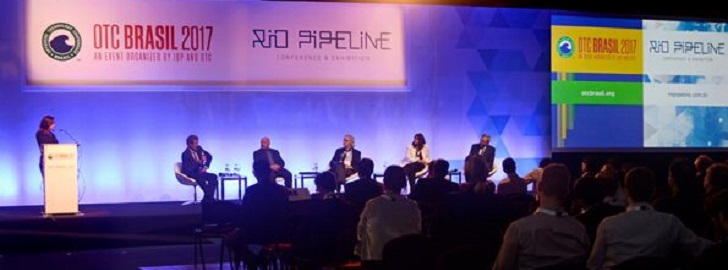Rio Pipeline termina com debate sobre inovação e regras

O último dia da Rio Pipeline foi marcado pelo debate sobre inovações tecnológicas para a indústria de dutos. O uso de drones e a análise de dados foram destacados como soluções mais rápidas e econômicas para os problemas encontrados por profissionais da área.
Com a recente regulamentação para a utilização de drones no Brasil, o mercado pode se adaptar e usar a ferramenta a seu favor. Carlos Hennig, diretor técnico da Skydrones, falou sobre como o uso dos aparelhos ajudam na captação de imagens em alta resolução e inspeções durante o fórum especial sobre o assunto.
Henning ressaltou a necessidade de integrar o emprego dos drones com a coleta de informações e análise de dados. “A tecnologia atual exige, além de um piloto especializado, uma pessoa para processar as imagens após o voo e analisar os dados. Assim chegamos a resultados mais precisos”, explicou.
Danny Aronson, da Transpetro, disse que os recursos de Big Data & Analytics nos sistemas de midstream (dutos e terminais) ainda estão em desenvolvimento. “O uso de Big Data pode ajudar a achar soluções para o que nós nem sabíamos que existia. A logística de transporte de combustível, por exemplo, pode nos trazer dados que otimizem a compra e entrega da quantidade do produto”, ressaltou.
Outra questão importante levantada no último dia foi o futuro da regulamentação. Para a Luciana Rocha, da Agência Nacional do Petróleo (ANP), mudanças devem ser feitas para se adaptar ao futuro do setor. “Desde a aprovação da legislação para o gás natural, em 2009, nenhum gasoduto foi construído. Propostas como a ‘Gás para crescer’, se aprovadas, trarão mais oportunidades para o setor, como a aprovação para exploração e não mais uma concessão como é hoje”, explicou.
O Chairman da Rio Pipeline 2017, Marcelino Guedes, pediu, ao final do evento, foco na internacionalização do setor brasileiro, com a troca de experiência com outros países.
“Depois do sucesso desta edição, com mais de 1400 pessoas presentes, temos que ocupar o nosso espaço na comunidade internacional e mostrar nossa competência na International Pipeline Conference (IPC), em 2018, no Canadá”, destacou Marcelino, ainda sobre a internacionalização do segmento de dutos.
Premiações
Durante o terceiro dia de evento projetos foram premiados. Pedro Altoé Ferreira recebeu o Calgary Award, instituído em 2001 pelo IBP. Como parte do prêmio, o vencedor vai se apresentar na International Pipeline Conference, em 2018, em Calgary, Canadá.
Tran Mah-Paulson, da TWD, ganhou o Global Pipeline Award, prêmio que é concedido desde 2005 pela Divisão de Sistemas de Dutos (PSD) da Sociedade Americana de Engenheiros Mecânicos (ASME) em reconhecimento a inovações e avanços tecnológicos realizados por organizações na área de transporte dutoviário.
A cerimônia também homenageou o ex-diretor da Petrobras Orfila Lima dos Santos com o Life Achievement Award pelo trabalho pioneiro no setor de dutos. Falecido em 2016, a filha Isabel recebeu o prêmio.
A Rio Pipeline conta com o patrocínio da Petrobras; Rosen; Transportadora Brasileira Gasoduto Bolívia-Brasil (TBG); Nova Transportadora do Sudeste (NTS); Mattos Filho Advogados; e Tory-Tech.